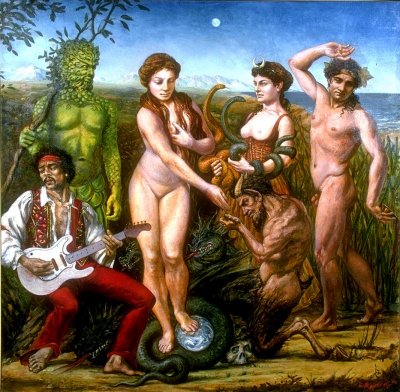|
Gaia, also spelled Ge, was the Earth. She is rarely even referred to as a deity, she is more a power. What is. She was one of the firsts. Well, one of the firsts in some versions. There are actually a couple of different Creation myths, and not all of them include Gaia (I know, it shocked me, too). The original Greek Mythology (ie, pre-Classical) was was Pelasgian myth (the Pelasgians came to Greece from the Asia Minor 3,000 years before Hesiod). The Pelasgian creation story focuses on Eurynome, the Goddess of All Things. But you can go to the Myth Page on Eurynome's Creation Story if you want to learn more about that. Here, we will focus on Gaia. There are two parts: Creation of Her and Creation by Her.
Creation of Her There are two accepted versions of Classical creation: Hesiod's and
Ovid's. Both versions begin with Gaia's emergence from Chaos. She has a
parthenogenic birth (ie, only one parent needed). According to Ovid, Gaia
pretty much just appeared (similar to the Judeo-Christian creation story).
After her birth, Ovid continued to see the hand of a Creator at work (an
un-named Creator), who populated Gaia with the necessary mountains, seas,
flora, and fauna. I much prefer Hesiod's version. Gaia, the beautiful, rose up, And now back to the story. According to Hesiod, the first beings sprang into existance without cause or explanation. After Gaia came Tartarus (the lowest level of the Underworld, also viewed as a sort of huge cave or pit) and then came Eros: Erotic Love. Chaos continues her parthenogenic streak, giving birth to Erebus and Nyx. In her sleep, Gaia gives parthenogenic birth to Uranus (the Universe, who emerges as big and powerful as Gaia) and Pontus (the Sea, and the God of the Sea). Uranus, bursting (literally) with love for Gaia (possible only by the creation of Eros, you see), showers her with fertile rain and this is how Gaia gives birth to the rest of creation (you remember, seas, mountains, etc. - we already covered this with Ovid). Gaia and Uranus also gave birth to the Titans, the three Cyclopes and the three Hundred-Armed Giants.
Creation by Her Parthenogenesis
Uranus
Uranus' Blood (there's a good story by the way)
Okay! That's all for now. There are plenty of stories with Gaia involved
in them. If you are interested in knowing them, please write me. Hopefully
they will someday be on the site, but that day seems farther and farther
away. Sigh. Okay, now for my finishing praise of Gaia. Oh Goddess, Source of Gods and Mortals, ~Orphic Hymn to Gaia~ translated and interpreted by Virginia Stewart, M.Ed.
|




